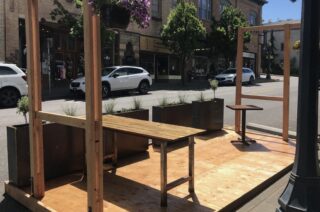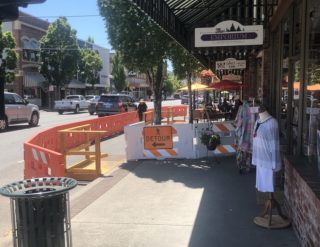
(Image: City of Hood River)
The Oregon Department of Transportation is trying.
The agency that’s pushing to expand freeways throughout the Portland region and has become Oregon’s de facto advocacy organization for car users, wants to be seen as innovative and nimble; but a situation in the city of Hood River shows the lengths businesses had to go just to use a few curbside parking spaces on one of the agency’s state highways.
Earlier this month businesses along Hood River’s main drag of Oak Street started building “street seat” installations to give customers more space to eat and drink. The efforts were part of a parklet permit program launched by the City of Hood River at the end of June.
“[The parklets] are not acceptable in terms of where they are and how they’re constructed.”
— Rian Windsheimer, ODOT Region 1 Director
But according to ODOT’s Region 1 Manager Rian Windsheimer, Hood River never received final approval to permit businesses on Oak Street — which happens to be State Route 30, an ODOT-owned highway. “Unfortunately, Hood River proceeded with allowing businesses to go and put those in place on the Historic Highway and the State Highway without working with ODOT to approve the parklet plans,” Windsheimer told members of the Historic Columbia River Highway Advisory Committee at their meeting on July 13th.
Windsheimer went on to say that he supports the parklet idea, but the wooden benches, tables and other features built in the parking lane, “Are not acceptable in terms of where they are and how they’re constructed.”
ODOT claims their hands are tied due to federal Highway Trust Fund policy that allows only “transportation related activity” on state right-of-way.
One of ODOT’s suggestions was to relocate the parklets onto sidestreets; but the City of Hood River didn’t like that idea. “It’s a very fluid situation, we’re trying to figure out what to do,” Windsheimer said at the meeting.
Advertisement
Two days later local media reported that ODOT crews planned to remove the parklets. Fortunately Windsheimer intervened and continued to negotiate with business owners. Those discussions helped inform official ODOT design guidance and a permit process for businesses along state highways.

On July 20th, ODOT released a statement about their new Reopening Communities, Re-envisioning Spaces Program, an effort to, “Re-envision how to safely adapt public spaces within the state highway system.” ODOT offered an example of a business in Grants Pass that received a permit to place two tables on a sidewalk.
The big catch with ODOT’s permit program is that the agency will only allow “transportation” uses on state highways. This means no parklets or seating in the roadway. As you can see in the image ODOT shared from Grants Pass, the only new use they permit in the highway is people walking. “ODOT urges cities to re-envision additional [parking] spaces with ideas like detouring local traffic onto state highways, using alleys or empty lots, or transferring ownership of state sidewalks or streets to the city,” their statement said.
In order to maintain their outdoor dining tables and seating on the street, the City of Hood River had to request a jurisdictional transfer from ODOT to the city. ODOT has obliged and is working out the details. According to a story in Hood River News published Wednesday (7/22), one of the businesses will be allowed to keep their parklet on Highway 30, while another will have to move it to a private parking lot behind their business.
The businesses claim they built these parklets because ODOT signaled support, then they were threatened with having to remove them, now ODOT says some of them can stay. What a mess.
One interesting takeaway from this is how ODOT interprets the “transportation related activity” definition from the Highway Trust Fund. Under their interpretation, an empty parked private vehicle is transportation related, but an empty dining table is not. If ODOT is truly committed to, “re-envisioning how to safely adapt public spaces within the state highway system,” perhaps they should be more flexible. What if they allowed parklets as long as they’re equipped with wheels?
In related news, Washington’s DOT released a program earlier this month that gives local jurisdictions permission to re-allocate space on state highway lanes for the exclusive use of walkers and rollers.
— Jonathan Maus: (503) 706-8804, @jonathan_maus on Twitter and jonathan@bikeportland.org
— Get our headlines delivered to your inbox.
— Support this independent community media outlet with a one-time contribution or monthly subscription.

